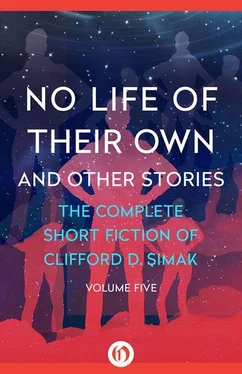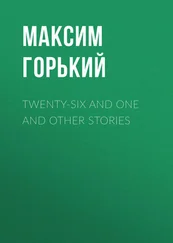The sun was setting when he came back down the track, turning off to go down to the camper parked beside the spring. He had spent the day upon the ridge and he would not spend another. Tomorrow he would leave. There was no reason for staying longer. There might be something here that needed finding, but nothing he could find.
He was hungry, for he had not eaten since breakfast. The fire was dead and he rekindled it, cooked a meal and ate it as the early autumn dusk crept in. Tired from his day of tramping, he still felt no need of sleep. He sat in the camp chair and listened to the night close down. The eastern sky flushed with the rising moon and down in the hills that rose above the river valley a couple of owls chortled back and forth.
Finally, he rose from the chair and went into the camper to get the bottle. There was some whiskey left and he might as well finish it off. Tomorrow, if he wished, he could buy another. In the camper, he lit the lantern and placed it on the desk. In the light of the lantern, he saw the gizzard stone, where he had left it on the desk top the night before. He picked it up and turned it until he could see the faint inscription on it. He bent forward to try to study the faint line, wondering if he might have mistaken some small imperfection in the stone as writing, feeling a nagging doubt as to the validity of his examination of it the night before. But the cryptic symbols still were there. They were not the sort of tracery that could occur naturally. Was there anyone on earth, he wondered, who could decipher the message on the stone? And even asking it, he doubted it. Whatever the characters might be, they had been graven millions of years before the first thing even faintly resembling man had walked upon the earth. He dropped the stone in his jacket pocket, found the bottle, and went out to the fire.
There was an uneasiness in him, an uneasiness that seemed to hang in the very air. Which was strange, because he had not noted the uneasiness when he had left the fire to go into the camper. It was something that had come in that small space of time he’d spent inside the camper. He studied the darkening terrain carefully, and there was movement out beyond the campfire circle, but it was, he decided, only the movement of trees shaken by the wind. For in the short time since early evening, the wind had shifted to the north and was blowing up a gale. The leaves of the huge cottonwood under which the camper sat were singing, that eerie kind of song that leaves sing in a heavy wind. From the ridge above came the banging clatter of the windmill—and something else as well. A whistle. The well was whistling. He heard the whistle only at intervals, but as he listened more attentively to catch the sound of it, it became louder and consistent, a high, unbroken whistling that had no break or rhythm, going on and on.
Now there was movement, he was certain, beyond the campfire light that could not be accounted for by the thrashing of the trees. There were heavy thumpings and bumpings, as if great ungainly bodies were moving in the dark. He leaped from the chair and stood rigid in the flickering firelight. The bottle slipped from his fingers and he did not stoop to pick it up. He felt the panic rising in him and even as he tried to brush it off, his nerves and muscles tightened involuntarily in an atavistic fear—fear of the unknown, of the bumping in the dark, of the uncanny whistling of the well. He yelled, not at what might be out beyond the campfire, but at himself, what remained of logic, what remained of mind raging at the terrible fear that had gripped his body. Then the logic and the mind succumbed to the fear and, in blind panic, he ran for the camper.
He leaped into the cab, slammed himself into the seat, reached out for the starting key. At the first turn of the key, the motor exploded into life. When he turned on the headlights, he seemed to see the bumping, humping shapes, although even in the light he could not be sure. They were, if they were there at all, no more than heavier shadows among all the other shadows.
Sobbing in haste, he put the engine into gear, backed the camper up the slope and in a semicircle. Then, with it headed up the slope, he pushed the gear to forward. The four-wheel drive responded and, slowly gathering speed, the camper went charging up the hill toward the track down which he had come, past the thumping windmill, only hours before.
The spidery structure of the windmill stood stark against the moon-washed sky. The blades of the rotating wheel were splashes of light, catching and shattering the feeble light of the newly risen moon. Over it all rose the shrieking whistle of the well. The farmer, Thomas remembered, had said that the well whistled only when the wind blew from the north.
The camper reached the track, barely visible in the flare of headlights and Thomas jerked the wheel to follow it. The windmill now was a quarter of a mile away, perhaps less than a quarter mile. In less than a minute, he would be past it, running down the ridge, heading for the safety of another world. For this ridge, he told himself, was not of this world. It was a place set apart, a small wedge of geography that did not quite belong. Perhaps, he thought, that had been a part of its special charm, then when one entered here, he shed the sorrows and the worries of the real world. But, to counterbalance that, he also found something more frightening than the real world would conjure up.
Peering through the windshield, it seemed to Thomas that the windmill had somehow altered, had lost some of its starkness, that it had blurred and changed—that, in fact, it had come alive and was engaging in a clumsy sort of dance, although there was a certain flowing smoothness to the clumsiness.
He had lost some of his fear, was marginally less paralyzed with fear than he had been before. For now he was in control, to a certain extent at least, and not hemmed in by horrors from which he could not escape. In a few more seconds, he would be past the windmill, fleeing downwind from the whistle, putting the nightmare all behind him. Putting, more than likely, his imagination all behind him, for the windmill could not be alive, there were no humping shapes …
Then he realized that he was wrong. It was not imagination. The windmill was alive. He could see its aliveness more clearly than imagination could have shown it. The structure was festooned and enwrapped by wriggling, climbing shapes, none of which he could see in their entirety, for they were so entangled in their climbing that no one of them could be seen in their entirety. There was about them a drippiness, a loathesomeness, a scaliness that left him gulping in abject terror. And there were, as well, he saw, others of them on the ground surrounding the well, great dark, humped figures that lurched along until they crossed the track.
Instinctively, without any thought at all, he pushed the accelerator to the floorboards and the camper leaped beneath him, heading for the massed bodies. He would crash into them, he thought, and it had been a silly thing to do. He should have tried to go around them. But now it was too late; panic had taken over and there was nothing he could do.
The engine spit and coughed, then slobbered to a halt. The camper rolled forward, came to a staggering stop. Thomas twisted the starter key. The motor turned and coughed. But it would not start. All the dark humps bumped themselves around to look at him. He could see no eyes, but he could feel them looking. Frantically, he cranked the engine. Now it didn’t even cough. The damn thing’s flooded, said one corner of his mind, the one corner of his mind not flooded by his fear.
He took his hand off the key and sat back. A terrible coldness came upon him—a coldness and a hardness. The fear was gone, the panic gone; all that remained was the coldness and the hardness. He unlatched the door and pushed it open. Deliberately, he stepped down to the ground and moved away from the camper. The windmill, freighted with its monsters, loomed directly overhead. The massed humped shapes blocked the track. Heads, if they were heads, moved back and forth. There was the sense of twitching tails, although he could see no tails. The whistling filled the universe, shrill, insistent, unending. The windmill blades, unhampered by the climbing shapes, clattered in the wind.
Читать дальше












